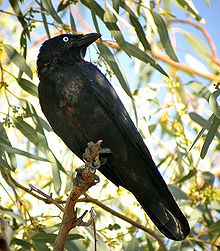
Summary
The little crow (Corvus bennetti) is an Australian species of crow, very similar to the Torresian crow in having white bases to the neck and head feathers (shown when ruffled in strong wind) but slightly smaller (38–45 cm in length) and with a slightly smaller bill. It has the same white iris that distinguish the Australian species from all other Corvus except a few island species to the north of Australia, and one from Eurasia, the jackdaw (Corvus monedula). Like the Australian raven, this species has a blue ring around the pupil.
| Little crow | |
|---|---|

| |
| Scientific classification | |
| Domain: | Eukaryota |
| Kingdom: | Animalia |
| Phylum: | Chordata |
| Class: | Aves |
| Order: | Passeriformes |
| Family: | Corvidae |
| Genus: | Corvus |
| Species: | C. bennetti
|
| Binomial name | |
| Corvus bennetti North, 1901
| |

| |
Distribution and habitat edit
It ranges over western and central Australia, often inhabiting very dry, near desert areas. It frequents small country towns and cultivated areas, where its flocks have reminded people of the European rook.
Etymology edit
C. bennetti was named in honour of the New South Wales ornithologist and collector of natural history specimens, Kenric Harold Bennett.[2]
Behaviour edit
Diet edit
Its food is mainly taken from the ground and includes insects, cereals and other seeds. It is less of a scavenger than the Torresian crow.
Nesting edit
It usually nests in small, loose colonies, building stick nests lined with mud (the only Australian species of Corvid known to do this).
Call edit
The little crow's calls range from a harsh hark-hark-hark-hark to a more raven-like ah-ah-ah.
Image links edit
- Little Crow 1
- Little Crow 2
- Little crow series
References edit
- ^ BirdLife International (2016). "Corvus bennetti". IUCN Red List of Threatened Species. 2016: e.T22706030A94047270. doi:10.2305/IUCN.UK.2016-3.RLTS.T22706030A94047270.en. Retrieved 11 November 2021.
- ^ Beolens, Bo; Watkins, Michael; Grayson, Michael (2014). The eponym dictionary of birds. London: Bloomsbury Publishing. ISBN 9781472905741. OCLC 882574116.
- BirdLife International (2016). "Corvus bennetti". IUCN Red List of Threatened Species. 2016: e.T22706030A94047270.



